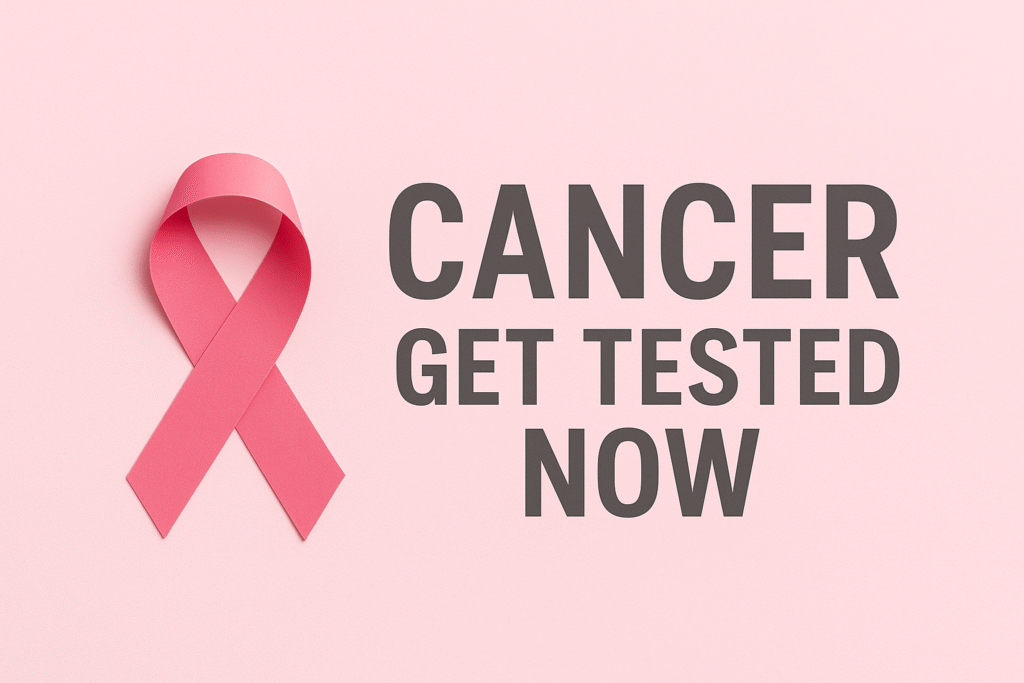

If You Have These 5 Breast Cancer Risk Factors, You NEED to Get Tested Now
- Breast Cancer Risk Is Real (Even If You Feel Fine)
- Top Breast Cancer Risk Factors That Demand a Genetic Test
- Genetic Testing for Breast Cancer Reveals What Mammograms Can’t
- Breast Cancer Cases: Genetics Still Matter
- Should You Get a Genetic Test for Breast Cancer Risk?
- Fact: Breast Cancer Risk in Younger Adults Is Increasing
- Lifestyle Changes Don’t Replace Genetic Testing
- Take a Genetic Test Before Breast Cancer Risk Turns Into Reality
Most people think breast cancer starts with a lump. But for millions, the risk starts earlier, hidden in daily life, family history, and genetics. And when it finally appears on a mammogram, it’s often been developing for years.
That’s why knowing your breast cancer risk factors isn’t enough. If even one of them applies to you, it’s time to take the next step: genetic testing.
This simple test looks at your DNA and tells you the truth that scans can’t show.
Breast Cancer Risk Is Real (Even If You Feel Fine)
Breast cancer is the most common cancer among women globally. But many people who develop the disease never had symptoms or warning signs. According to the CDC, risk increases with age and other factors, most of which aren’t visible without testing.
A genetic test shows whether you have inherited mutations that raise your risk. It’s fast, easy, and can help you plan ahead.
Top Breast Cancer Risk Factors That Demand a Genetic Test
If any of the following apply to you, it’s time to go beyond screening. These risk factors come directly from the CDC, BreastCancer.org, Mayo Clinic, Cancer Research UK, and the National Breast Cancer Foundation.
- You’re 50 or older
Most breast cancers are diagnosed in people over 50. But many of the risk-related mutations have been present for decades before that. Age alone is one of the strongest signals that you should test. Cancer risk accelerates with time, even in those with no symptoms. Genetic testing helps catch that risk before it becomes a problem.
- You’ve had radiation therapy to your chest
Those who received chest radiation (often for conditions like Hodgkin’s lymphoma) before age 30 are at higher risk. The risk increases the younger you are at the time of exposure. This kind of damage doesn’t fade with time; it compounds. A genetic test gives you a clearer picture of how vulnerable you may still be.
- Your first period started before age 12
Starting menstruation early increases lifetime exposure to estrogen. This hormone plays a role in breast cell growth and is linked to higher cancer risk over time. Earlier hormonal cycling means more opportunities for DNA changes. Testing helps identify whether those changes have already taken hold.
- You started menopause after age 55
Late menopause continues estrogen exposure into later life. This increases the chance that cells will mutate and grow abnormally. Combined with genetic risk, extended estrogen activity can push the risk even higher. Knowing your mutation status helps you map the right response.
- You’ve never had children or had your first child after 30
Not giving birth or delaying childbirth changes hormonal patterns. The National Breast Cancer Foundation confirms that this results in a slightly higher lifetime risk. Without pregnancy to regulate hormone exposure, estrogen remains elevated for longer stretches. A genetic test can clarify whether that added exposure becomes a real threat.
Genetic Testing for Breast Cancer Reveals What Mammograms Can’t
A mammogram looks at changes in breast tissue. A genetic test looks at what’s inside your cells before any visible changes begin.
What a genetic test can show you
- Whether you carry harmful mutations like BRCA1, BRCA2, PALB2, TP53, CHEK2, or ATM
- If your risk level is high, even without symptoms
- Whether you need an MRI or advanced screening earlier than others
- If your children or siblings could be at risk too
BreastCancer.org reports that nearly half of the people with BRCA mutations have no close relatives with breast cancer.
That means family history alone can’t be trusted. A test removes the guesswork.
Breast Cancer Cases: Genetics Still Matter
Only about 5%-10% are driven by mutations that are inherited rather than acquired over time, according to the CDC. But many more are influenced by inherited factors combined with lifestyle and hormonal exposure.
Carrying a risk gene doesn’t mean you’ll get cancer, but it raises your odds. And knowing about that gene gives you time to act, years before anything appears on a scan.
Should You Get a Genetic Test for Breast Cancer Risk?
When you should consider genetic testing
- You’ve been diagnosed with breast cancer before age 50
- You have a close relative with breast, ovarian, or pancreatic cancer
- You’ve had chest radiation
- You want to understand your inherited risk, even with no symptoms
You don’t need to “qualify” to benefit from a test. Even one risk factor is enough.
Fact: Breast Cancer Risk in Younger Adults Is Increasing
New data from Cancer Research UK and BreastCancer.org shows a troubling trend: breast cancer diagnoses in people under 40 are rising. The reasons include:
- Delayed childbirth
- Hormonal contraceptives
- Sedentary lifestyles
- Increased alcohol use
If you’re in your 20s or 30s and have even one risk factor, waiting until 50 for a mammogram is too late. A genetic test gives you a head start.
Lifestyle Changes Don’t Replace Genetic Testing
There are two kinds of risk: the kind you can change, and the kind you can’t.
How to reduce risks
- Exercising regularly
- Limiting alcohol
- Maintaining a healthy weight
- Avoiding combined hormone therapy
Take a Genetic Test Before Breast Cancer Risk Turns Into Reality
But none of the above replaces what you learn from your DNA. If you carry a high-risk mutation, lifestyle changes help, but early surveillance matters more.
Symptoms are not a starting point. Diagnosis is not a plan. Breast cancer risk begins long before either one shows up. Ignoring that risk gives it time to grow.
A Lifecode genetic test shows you what mammograms can’t. It examines your DNA for mutations linked to breast cancer and tells you if you’re more likely to develop it. That knowledge can lead to earlier screening, targeted prevention, and a better outcome if something is found later.
Your next steps are clear:
- Order the at-home saliva kit
- Send your sample to our lab
- Get your personalized results within 2–3 weeks
- Speak with a certified Lifecode genetic counselor who explains every part of your report, answers your questions, and helps you decide what to do next
Every day you wait is a day you give risk more room. Instead, get answers that guide real decisions about your health, your screening plan, and your future.

Can You Inherit Migraine Risk The Truth About Women’s Brain Health
Can You Inherit Migraine Risk The Truth About Women’s Brain Health The Genetic Link to Migraines, It Is More Than Just Bad Luck Why Women are More...


Unlocking Your Body’s Blueprint: Genetic Clues to Pregnancy Complications and Hypertension
Unlocking Your Body's Blueprint: Genetic Clues to Pregnancy Complications and Hypertension The Intricate Dance of Genes and Health Decoding Pregnancy Complications Through Genetics The Genetic Roots of...

Education: Bachelor of Pharmacy (B.Pharm) from the Tata Institute of Social Sciences (TISS), Mumbai Experience: Agarwal is a seasoned pharmacist with over 7 years of experience in the pharmaceutical field. She has worked in various settings, including hospital pharmacies and community clinics, where she has excelled in medication management, patient counseling, and clinical support. Agarwal is known for her expertise in drug therapy optimization and patient safety. In addition to her practical experience, she contributes to health journalism, focusing on pharmaceutical advancements and health policy, and is involved in research projects aimed at improving medication practices and health outcomes. is known for her expertise in drug therapy optimization and patient safety. In addition to her practical experience, she contributes to health journalism, focusing on pharmaceutical advancements and health policy, and is involved in research projects aimed at improving medication practices and health outcomes.


